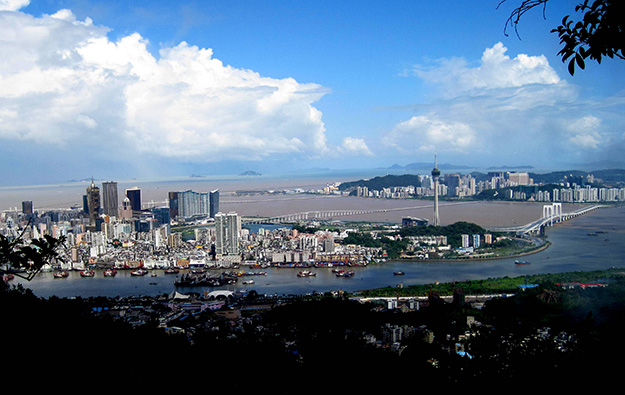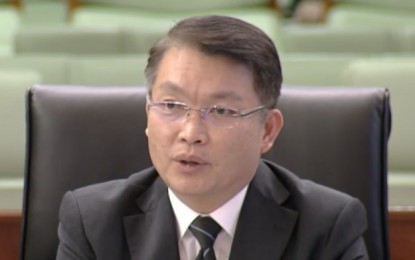Low risk for Macau of enhanced China anti-graft action: IMF
Feb 15, 2017 Newsdesk Latest News, Top of the deck

The International Monetary Fund (IMF) says in its latest Macau report it thinks there is a “low” risk of further policy tightening in mainland China – regarding matters such as anti-corruption measures and capital outflow – that could directly hurt Macau’s tourism.
But it added should such events occur, the impact would be “high”, resulting in “sharply-reduced spending” by mainland visitors.
The report from the Washington D.C.-based body also noted that while it thought there was a low chance of current anti-graft measures and visa policy for outbound mainland residents actually being eased; were it to happen, the positive impact would be high, with stronger VIP revenue and a greater number of mainland Chinese eligible to visit Macau.
In 2016 approximately 65 percent of Macau’s roughly 30.95 million visitors were from mainland China, according to preliminary data released on January 18 by the Macao Government Tourism Office.
The IMF’s 53-page report on Macau – prepared by the fund’s Asia and Pacific Department and released on Tuesday – adds it thinks there is a “medium” chance of faster-than-expected withdrawal of loose monetary policy in the United States, which could strengthen the U.S. dollar against other currencies.
This is of significance to Macau because most bets in Macau casinos are denominated in the Hong Kong dollar, a currency pegged against the U.S. dollar. Many of Macau’s gamblers have their assets denominated in China’s currency the yuan. Therefore yuan depreciation makes betting in Macau, using Hong Kong dollars, a more expensive proposition, investment analysts covering the Macau casino market have previously mentioned.
Macau’s currency the pataca is indirectly pegged to the U.S. dollar via its MOP1.03/HKD1.00 exchange rate.
For Macau’s underlying economy, where non-casino gambling transactions are mostly denominated in patacas, such a change in U.S. monetary policy could result in an increase in the cost of credit, and likely, “a real effective appreciation” of the local currency against that of mainland China, said the IMF.
The fund noted that while it views as “high” the risk of increased regional competition to Macau via new casino projects in neighbouring places, it thinks the actual impact on gaming revenue and tourism arrivals would be “low”.
The report also said it thought the possibility of land reclamation schemes – additional to those already announced by the Macau government – was “low”. The IMF suggested the positive impact of any such measures would be “medium” with additional land supporting diversification of tourism beyond gaming, in line with central and local government policy, and improving affordability in the local housing market.
Spillover limited
The fund further noted in its report that the spillover to Macau’s broader economy from the correction to the city’s casino gross gaming revenue performance seen since 2014, had been “surprisingly limited”, notwithstanding the economic importance of the casino sector.
The institution stated that in the 15 years since the return in 1999 of Macau to Chinese administration, the city’s real gross domestic product had grown by an annual average of 10.6 percent, fuelled “in large part” by Macau’s effective monopoly on casino gaming within China. This had resulted in casino services making up a significant portion of economic activity.
“The economic boom came to an abrupt end in 2014 with gaming exports falling by a cumulative 50 percent,” said the IMF.
Gaming services in Macau are included in exports when calculating the city’s GDP. That is in order to reflect expenditure by tourists in the city’s casinos.
“The sharp fall in exports led output to fall by one-third in cumulative terms but the spillovers to the broader economy were surprisingly limited,” noted the fund.
“Unemployment has remained below 2 percent, median real wages have stabilised but remained up 7 percent over end-2014 levels, and non-performing loans in the financial sector continue to hover around zero,” added the authors. “The primary source of this resilience is that even though average spending per tourist fell sharply, the number of tourists was basically stable keeping capacity utilisation relatively high. As a result, most of the contraction in revenues was absorbed in the form of lower extraordinary profits rather than reduced employment,” stated the IMF.
The recent correction in exports had underscored the urgency of transitioning to a more diversified economic model, said the fund.
“Fortunately, the Macau Special Administrative Region enters this transition from a position of strength as there are significant buffers,” the report noted.
Due to high taxes on the gaming sector – an effective rate of 39 percent on wagers – and “discipline on public spending,” Macau had “zero gross public debt and fiscal reserves equal to 95 percent of GDP,” said the fund.
Additionally, after 15 years of double-digit current account surpluses, foreign exchange reserves were roughly US$19 billion, stated the IMF.
“Real output is expected to contract for a third consecutive year in 2016. However, external demand has begun to recover with gaming revenues posting six consecutive months of positive annual growth. In 2017, a low base will help increase growth above 2 percent despite continued weak domestic demand,” noted the fund.
“Further out, Macau… is well-positioned to record sustainable growth in the mid-single digits. In addition to its still highly valuable gaming monopoly within China, Macau… is an established tourist destination with significant geographic proximity to – and cultural affinity with – mainland China. Moreover, Macao SAR is now investing aggressively in non-gaming tourism and financial services,” said the IMF.
Related articles
-
 RWS casino renewal 2yrs on...
RWS casino renewal 2yrs on...Nov 19, 2024
-
 Macau 3Q GDP up 5pct driven by...
Macau 3Q GDP up 5pct driven by...Nov 18, 2024
More news
-
 Macau to get 36mln visitors in 2025:...
Macau to get 36mln visitors in 2025:...Nov 21, 2024
-
 Star Entertainment clinches US$130mln...
Star Entertainment clinches US$130mln...Nov 21, 2024
Latest News
Nov 21, 2024
Macau’s 2025 visitor tally could reach 36 million, or a circa 9-percent gain on this year’s projected 33 million. So said Lei Wai Nong (pictured in a file photo), the city’s Secretary for...Sign up to our FREE Newsletter
 (Click here for more)
(Click here for more)
Pick of the Day
”[Baccarat side bets in Macau] are becoming more popular amongst players, based on what we observed when we conducted our [monthly premium mass] table surveys”
George Choi and Timothy Chau
Analysts at Citigroup
Most Popular
 Gaming technology firm IGT reports hacking incident November 21, 2024
Gaming technology firm IGT reports hacking incident November 21, 2024  US$30bln 2025 GGR target achievable for Macau: CE November 19, 2024
US$30bln 2025 GGR target achievable for Macau: CE November 19, 2024  Marina Bay Sands projects 40pct EBITDA leap post extension November 20, 2024
Marina Bay Sands projects 40pct EBITDA leap post extension November 20, 2024  Macau big-event outdoor venue gets trial run Dec 28: CE November 20, 2024
Macau big-event outdoor venue gets trial run Dec 28: CE November 20, 2024  Future of gaming is the online format: Pagcor chairman November 20, 2024
Future of gaming is the online format: Pagcor chairman November 20, 2024









